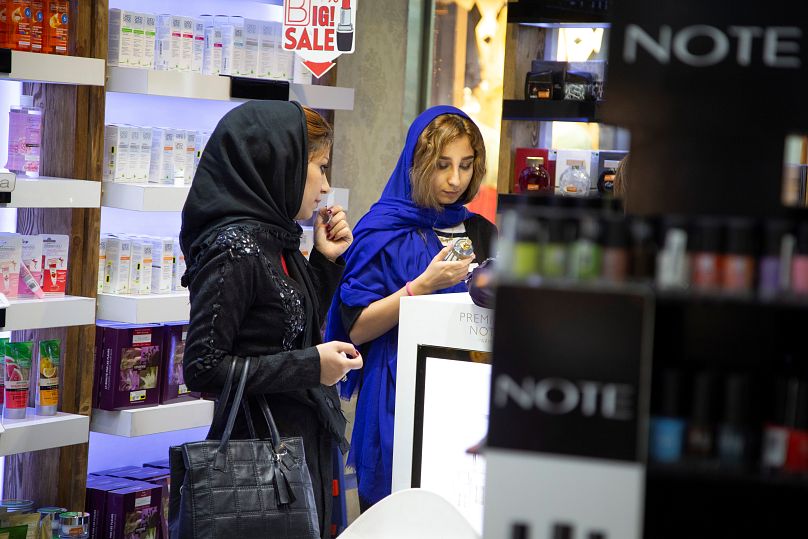The US hopes ever-increasing pressure will force Iran to give up its ambition for nuclear weapons, but Tehran says the latest measures are “useless”.
Hassan Rouhani said today (August 27) that Iran would not hold talks with the United States until Washington lifts sanctions against it.
The comments of Iran's president come as counterpart Donald Trump said he would meet Rouhani under the "right circumstances".
Trump withdrew from the Iran nuclear deal in 2018 and reimposed sanctions on the country in November.
The nuclear deal had lifted crippling sanctions in exchange for imposing limits on Iran's nuclear programme.
The US hopes ever-increasing economic pressure will force Iran to give up its ambition for nuclear weapons, but Tehran has waved away the measures as “useless”.
Rouhani said on Monday that the Iranian regime was not seeking a nuclear weapons programme.
Why were sanctions imposed?
Trump withdrew from the 2015 nuclear deal stating the deal had "lifted crippling economic sanctions on Iran in exchange for very weak limits on the regime's nuclear activity and no limits at all on its other malign behaviour".
Tensions between Tehran and Washington subsequently increased.
The Trump administration said in May they will continue to apply "maximum pressure" until the Iranians "change their destructive behaviour and return to the negotiating table".
It said in June it was imposing sanctions due to Iran's "provocative actions" including the alleged shooting down of a US drone.
Iran scaled back its commitments under the deal, enriching uranium above 3.67%, according to the International Atomic Energy Agency (IAEA) and announcing that it possessed more than 300kg of low-enriched uranium in July, which was the limit set by the 2015 deal.
Since May, there have been several incidents involving oil tankers in the Gulf, including Iran's seizure of the British-flagged Stena Impero in July.
Read more: Iran says downing of US drone was a 'firm response', can be repeated - Tasnim
Read more: UK to seek new maritime protection mission in Strait of Hormuz, says Hunt
Who do the sanctions target?
In May, Trump targeted Iran's iron, steel, aluminium and copper sectors.
One month later, the US president issued an executive order targeting a handful of figures within Iran’s leadership, imposing sanctions on the Supreme Leader of the Islamic Republic of Iran, Ayatollah Khamenei, and a slew of senior commanders in Iran's Islamic Revolutionary Guards Corps (IRGC).
“These commanders sit atop a bureaucracy that supervises … malicious regional activities, including its provocative ballistic missile program, harassment and sabotage of commercial vessels in international waters, and its destabilizing presence in Syria,” the US Treasury said.
He later targeted Mohammad Javad Zarif, Iran's foreign minister with sanctions, which Zarif said would have no effect on him as he does not have property or interests outside of Iran.
Sanctions work by outlawing trade with a particular country or person or limiting their access to financial markets and payment systems.
Any bank that “knowingly facilitates a significant financial transaction” for any of the listed officials could be cut off from the US financial system, the US said.
Will they work in practice?
Previous rounds of sanctions have been very effective in weakening Tehran.
Since the reimposition of sanctions in 2018, the export of oil has “fallen to particularly low levels … and is having a serious economic impact on revenue,” said Cailin Birch, Global Economist at The Economist Intelligence Unit.
In addition, the oil it does sell is being exported at a significantly discounted rate.
Iran exported 2.5 million barrels per day of crude oil in May 2018, according to the country's oil minister but that number is now estimated to be lower than 500,000 barrels per day.
The value of Iran's currency has plummeted in the last year, and inflation is up over 40% according to government figures and market data.
Sanctions imposed in June, however, were likely more about symbolism than the outcome. For a start, it is far from clear whether Khamenei or any of the IRGC commanders listed in the executive order even have any US-linked assets. Iran’s regime has also been through several rounds of sanctions in recent decades so has limited economic ties with US partners.
“It has been too dangerous for firms in the financial sector to do business with Iran for more than a year so the threat to cut these individuals off from the US financial system would seem to be more symbolic rather than anything that would have a measurable impact,” Birch said.
It does, however, send a message to ordinary Iranians that America's issue is not with their country, but its leadership.
Will they force Iran back to the negotiating table?
Trump’s tactic of applying maximum pressure on countries to force them into accepting better terms has had some success, Birch said, such as with important US economic partners who are heading into trade talks.
But it is unlikely to work with Iran’s leaders. “They’ve shown in previous rounds that they don’t negotiate under duress,” she said. “It has been the one clear lesson to draw from their activity on the international stage.
"It worked a little with Mexico, it didn’t work with North Korea or China and it is not going to work with Iran. I cannot see it being successful.”
Instead, the escalating rhetoric and White House policy confusion is likely to continue with an underlying risk of miscalculation on both sides.












